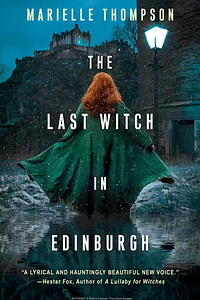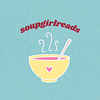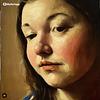You need to sign in or sign up before continuing.
Take a photo of a barcode or cover
emotional
hopeful
inspiring
reflective
sad
medium-paced
Plot or Character Driven:
A mix
Strong character development:
Yes
Loveable characters:
Yes
Diverse cast of characters:
Yes
Flaws of characters a main focus:
Yes
3.75+. Disclaimer: I pushed through this in a bit of a slump so I have full intentions to reread at some point. The prose and plot are 5 stars. The characters and dialogue are a more flat 3 stars. The execution of feminist themes is somewhere in between. It can feel heavy-handed at times. That said, if you want a feminist witchy story that verges on lit fic, but has a steady plot, it’s worth a try. Also, bonus sapphic romance.
emotional
hopeful
medium-paced
dark
emotional
medium-paced
Plot or Character Driven:
A mix
Strong character development:
Yes
Loveable characters:
No
Diverse cast of characters:
Yes
Flaws of characters a main focus:
Yes
I’m adding this to the list of books that has deeply affected who I am as a person because, wow.
I was not anticipating the powerful while somehow also subtle feminist themes. To be honest and probably dramatic, it healed something in me to see the women in this book work together despite their differences.
Pieces I loved:
-The gothic historical fiction tied in with fantasy was beautiful! The fantasy was subtle enough that I almost expect to go to Edinburgh and meet these witches in real life. To add to this, the villain personifies patriarchy and violence toward women in a really powerful way
-The attention to herbal knowledge with accuracy made me want to become an herbalist. These small details really filled out the story for me.
-The way that current events were tied in left me feeling empowered and hopeful in a way I haven’t in a while.
-Nelly didn’t become some crazy strong female leader and that was fucking powerful. She was timid and careful and I think that balanced well with Jean’s ferocity.
-Queer love
-Bisexual representation
-Trans representation
-Chronic illness representation
-A wide range of ages were also represented which was refreshing when most books seem to be about young 20 yr old women. I love the young women perspective but also seeing the world through the eyes of elderly women brought such a richness to the story.
Final thoughts: Simply? Everyone go read this book. It’s a perfect fall read because somehow it is both cozy and heart wrenching, subtle yet powerful.
I read this as an ARC from Net Galley in exchange for an honest review.
I was not anticipating the powerful while somehow also subtle feminist themes. To be honest and probably dramatic, it healed something in me to see the women in this book work together despite their differences.
Pieces I loved:
-The gothic historical fiction tied in with fantasy was beautiful! The fantasy was subtle enough that I almost expect to go to Edinburgh and meet these witches in real life. To add to this, the villain personifies patriarchy and violence toward women in a really powerful way
-The attention to herbal knowledge with accuracy made me want to become an herbalist. These small details really filled out the story for me.
-The way that current events were tied in left me feeling empowered and hopeful in a way I haven’t in a while.
-Nelly didn’t become some crazy strong female leader and that was fucking powerful. She was timid and careful and I think that balanced well with Jean’s ferocity.
-Queer love
-Bisexual representation
-Trans representation
-Chronic illness representation
-A wide range of ages were also represented which was refreshing when most books seem to be about young 20 yr old women. I love the young women perspective but also seeing the world through the eyes of elderly women brought such a richness to the story.
Final thoughts: Simply? Everyone go read this book. It’s a perfect fall read because somehow it is both cozy and heart wrenching, subtle yet powerful.
I read this as an ARC from Net Galley in exchange for an honest review.
Rating: 3.5 stars
This book started off pretty strong - the city of Edinburgh is heavily romanticized on social media, so I appreciated the realistic depiction of poverty in 1800s Scotland, the lore of the Cailleach was super compelling, and the general witchy atmosphere was very well established. I also appreciated the chronic pain/disability rep in Jean, as well as the trans rep in Ari. The parallels between the powers of Angus and modern day climate change was also very well done!
HOWEVER, I think things started to get dicey when it started really leaning into the topics of femicide, SA, and the patriarchy in the modern-day flash forward. Don't get me wrong - I do love me a good social commentary against a fictional backdrop. But I love it when it's done well, and unfortunately I think this book missed the mark on this one.
Even as someone who in general does not like or trust men, this book was...a lot. All in all, it felt like the undertones of the female rage in this book was rage without active healing, which just ended up making the protagonist and her witchy counterparts toxic. It felt like Nellie just kept poisoning herself (and her innocent adoptive daughter!!) with her own anger, shame, and fear for centuries without much character growth or healing, with the feminist commentary pretty much being a one note "I hate men"/"fuck the patriarchy" without much substance beyond that. I also really felt icky about the portrayal of Nellie and her adoptive daughter Chani's relationship, which was so codependent and borderline abusive (Nellie is so afraid of men that she severely isolates Chani by never allowing her to go to a real school).
I had really high hopes for this one, so I was definitely a bit disappointed when I ended up really struggling to finish the last ten chapters. Social commentary in fiction is best when done subtly, and I wish that more authors learn how to do that better instead of wacking it over our heads again and again through dialogue.
P.S. This is a bit nitpicky, but there were some jarring anachronisms too - I really don't think folks in 1800s Edinburgh knew what coconut smelled like???
This book started off pretty strong - the city of Edinburgh is heavily romanticized on social media, so I appreciated the realistic depiction of poverty in 1800s Scotland, the lore of the Cailleach was super compelling, and the general witchy atmosphere was very well established. I also appreciated the chronic pain/disability rep in Jean, as well as the trans rep in Ari. The parallels between the powers of Angus and modern day climate change was also very well done!
HOWEVER, I think things started to get dicey when it started really leaning into the topics of femicide, SA, and the patriarchy in the modern-day flash forward. Don't get me wrong - I do love me a good social commentary against a fictional backdrop. But I love it when it's done well, and unfortunately I think this book missed the mark on this one.
Even as someone who in general does not like or trust men, this book was...a lot. All in all, it felt like the undertones of the female rage in this book was rage without active healing, which just ended up making the protagonist and her witchy counterparts toxic. It felt like Nellie just kept poisoning herself (and her innocent adoptive daughter!!) with her own anger, shame, and fear for centuries without much character growth or healing, with the feminist commentary pretty much being a one note "I hate men"/"fuck the patriarchy" without much substance beyond that. I also really felt icky about the portrayal of Nellie and her adoptive daughter Chani's relationship, which was so codependent and borderline abusive (Nellie is so afraid of men that she severely isolates Chani by never allowing her to go to a real school).
I had really high hopes for this one, so I was definitely a bit disappointed when I ended up really struggling to finish the last ten chapters. Social commentary in fiction is best when done subtly, and I wish that more authors learn how to do that better instead of wacking it over our heads again and again through dialogue.
P.S. This is a bit nitpicky, but there were some jarring anachronisms too - I really don't think folks in 1800s Edinburgh knew what coconut smelled like???
I just finished The Last Witch in Edinburgh by Marielle Thompson, and I’m obsessed! If you loved Practical Magic, this is totally up your alley. The Edinburgh setting is perfect (seriously, I could read any story set there), and the LGBTQ+ storyline was really well done. Plus, there are little hints that a sequel might be possible! It flips between past and present, and honestly, both timelines were so good they could’ve been two separate books. Highly recommend—such a fun and magical read!
dark
mysterious
tense
medium-paced
This book is a tough one to review. I did enjoy it, and I will read more from this author, but there are some big caveats. It will be pretty divisive. The prose itself is absolutely beautiful, rich in historical detail and atmosphere, and, as a Feminist, I appreciate the unveiling of some of the small things that make being a woman exhausting--we can see the big things, but the microaggressions and attitudes often fly under the radar.
That said, the book is more about Nellie's journey to Feminism from the self-hatred she is taught by society than it is about apothecaries, witchery, or even shaking the patriarchy. Nellie could have used her art to fight all along, but she did not, which would be a bit weird even for the period. People have been using art for social commentary since ancient times. She is also a bit hard to root for at times: she abandons her brother, she's a bit dim at times, and is, as Jean so often says, a coward. She lives over 200 years and only grows rather suddenly at the end when Jean confronts her. The other characters are equally as annoying or simply non-entities; Jean is one-note rage and Chani is one-note perfect. Women in all our glorious complexity are not really represented.
The Cailleach content is fascinating, but does repeat. Women are called by her to love their own independence and "only then can you be a true hag," and yet we rarely see Nellie embodying the virtues of the Cailleach. How then does she get her second life? And why O why does she nor Jean ever teach other witches? Saying it's too dangerous is a copout. There's also not as much actual witching nor much herbal content, something I suspect was a draw for a lot of readers. We have a 200 year time skip that serves no purpose.
Men will not want to read this book because they don't come out very well in it, and the whole point of the book is that heaven forfend a man be made uncomfortable; if you feel any feminist rage (and you should), you will cheer at times, and yet it's 100% preaching to the choir. I'm not sure how to make the people read this book who really need to read it and grok that message, but the I don't think this one will do it. If anything, it may spur some younger readers to direct action, which I'm sure is worthwhile enough.
To end, if you enjoy books such as the most excellent [b:Shrill: Notes from a Loud Woman|29340182|Shrill Notes from a Loud Woman|Lindy West|https://i.gr-assets.com/images/S/compressed.photo.goodreads.com/books/1460015959l/29340182._SY75_.jpg|46238704] and other books of that ilk, then you'll enjoy reading this book, but it won't teach you anything you don't already know, and it will remind you of how little power we women have to affect the patriarchy, and how blind men are to the fact that it hurts them, too.
Read it for the Edinburgh atmosphere, the bits about the Crone, and the clever modern art installation at the end. Don't read it for plot or characterization.
I received a free copy of this book in a GoodReads giveaway. Thank you to the publisher.
That said, the book is more about Nellie's journey to Feminism from the self-hatred she is taught by society than it is about apothecaries, witchery, or even shaking the patriarchy. Nellie could have used her art to fight all along, but she did not, which would be a bit weird even for the period. People have been using art for social commentary since ancient times. She is also a bit hard to root for at times: she abandons her brother, she's a bit dim at times, and is, as Jean so often says, a coward. She lives over 200 years and only grows rather suddenly at the end when Jean confronts her. The other characters are equally as annoying or simply non-entities; Jean is one-note rage and Chani is one-note perfect. Women in all our glorious complexity are not really represented.
The Cailleach content is fascinating, but does repeat. Women are called by her to love their own independence and "only then can you be a true hag," and yet we rarely see Nellie embodying the virtues of the Cailleach. How then does she get her second life? And why O why does she nor Jean ever teach other witches? Saying it's too dangerous is a copout. There's also not as much actual witching nor much herbal content, something I suspect was a draw for a lot of readers. We have a 200 year time skip that serves no purpose.
Men will not want to read this book because they don't come out very well in it, and the whole point of the book is that heaven forfend a man be made uncomfortable; if you feel any feminist rage (and you should), you will cheer at times, and yet it's 100% preaching to the choir. I'm not sure how to make the people read this book who really need to read it and grok that message, but the I don't think this one will do it. If anything, it may spur some younger readers to direct action, which I'm sure is worthwhile enough.
To end, if you enjoy books such as the most excellent [b:Shrill: Notes from a Loud Woman|29340182|Shrill Notes from a Loud Woman|Lindy West|https://i.gr-assets.com/images/S/compressed.photo.goodreads.com/books/1460015959l/29340182._SY75_.jpg|46238704] and other books of that ilk, then you'll enjoy reading this book, but it won't teach you anything you don't already know, and it will remind you of how little power we women have to affect the patriarchy, and how blind men are to the fact that it hurts them, too.
Read it for the Edinburgh atmosphere, the bits about the Crone, and the clever modern art installation at the end. Don't read it for plot or characterization.
I received a free copy of this book in a GoodReads giveaway. Thank you to the publisher.






